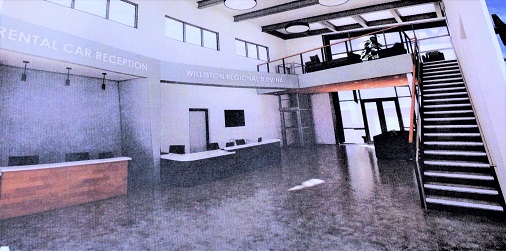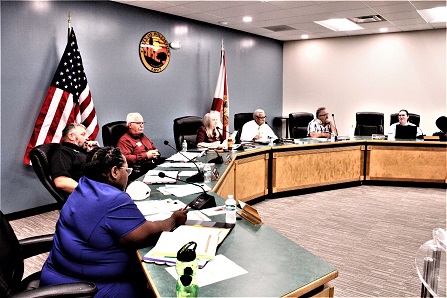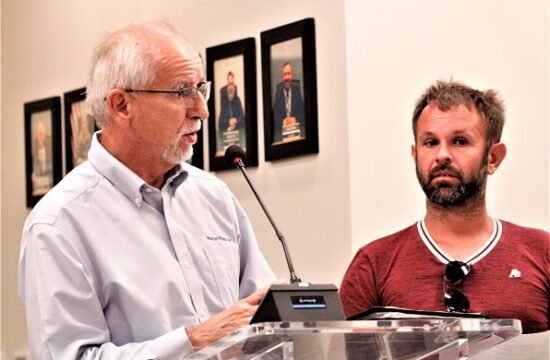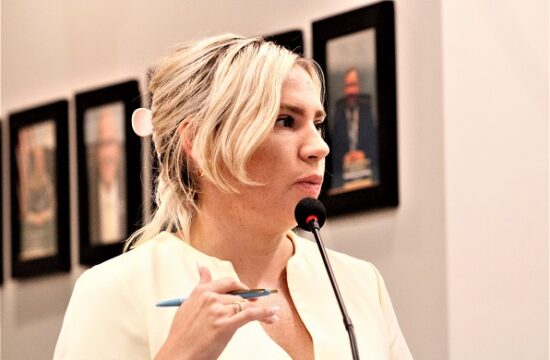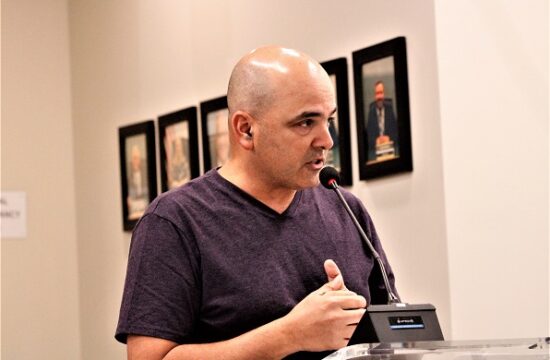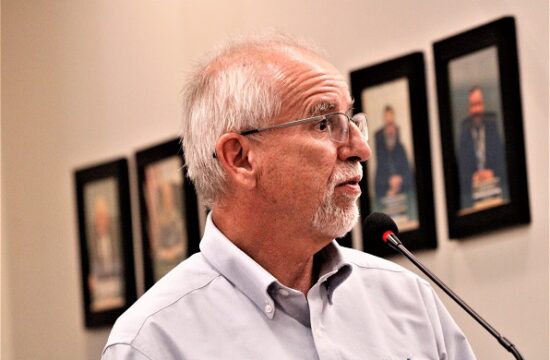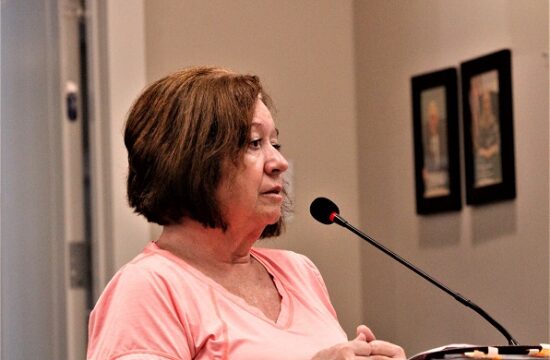By Terry Witt – Spotlight Senior Reporter
Williston Mayor Charles Goodman Tuesday promised he would veto an ordinance the city is rewriting if it strips him of his legal authority to veto a change in the way electric rates are raised.
The short-handed city council debated for more than 90 minutes whether to pass an ordinance that would change the process for approving an electric rate increase from the usual two public hearings to a one-time reading of a resolution.
Council members ultimately voted 3-0 to completely rewrite the ordinance and add two public hearings, or a hearing and a workshop to the rate approval process, but formal approval of the rate hike would be done by resolution.
The change means future increases to the electric rate can’t be vetoed by the mayor if done by council resolution. The mayor has the power to veto ordinances, not resolutions.
The council is proposing an 8.9 percent increase in electric rates beginning Oct. 1 when the new fiscal year begins. Rates would rise by 1.20 percent in 2023, 1.50 percent in 2024, 1.90 percent in 2025, and 1.70 percent in 2026.
The process for approving electric rates in the past used an ordinance. The city would publish a public notice in advance of two public hearings to give residents an opportunity to voice their opinion before the council made a decision on whether to approve the rates in the ordinance.
The city charter grants the mayor the right to veto ordinances. The city council can override the veto if four of the five council members vote to overturn it.
There were 11 resolutions on the city council agenda Tuesday covering a range of public issues, some of them routine, others of greater importance. The only ordinance on the agenda was intended to change the electric utility rate approval process to one that uses a resolution. It will come back to the council for approval.
The city charter is like a municipal constitution for Williston. It provides a framework of regulations and policies for the operation of the city. The charter can’t be changed without a vote of the citizens. Goodman is concerned that the city’s use of a resolution to approve the proposed electric rate hike is aimed at silencing his ability to veto the action taken by the council.
“By our charter, the mayor cannot vote. The only opportunity the mayor has to impact the vote is with the veto,” Goodman said. “If you change this to resolution, you effectively silence the mayor because the mayor has absolutely no ability to challenge the council, to suggest to the council or try to implore to the council that they revisit any particular thing – that is the difference between an ordinance and a resolution – if you pass this you effectively silence the mayor because it is only through the veto that I as mayor can get the council to reconsider. If it’s a resolution I just need to sit up here and be quiet because there’s not a thing that I can do. That is my problem with changing this from an ordinance to a resolution. I think it’s being put into too small a picture and there are too many complaints that are not being addressed.”
Goodman said he felt it was only fair to announce to the council that if it proceeds with an ordinance that changes the final approval process for rate hikes to a resolution, he will veto the law.
“Should the council approve this ordinance to change to a resolution, by charter I have the responsibility and the right and I will be vetoing this ordinance according to the charter. The council can revisit this by overriding my veto if they choose,” he said.
Goodman didn’t contest the size of the rate hike. His issue was the use of a resolution to potentially silence his veto power granted by the city charter.
The city council met earlier this year as a charter review commission to consider changes to the city charter, but no proposal was ever passed that would remove the mayor’s power of veto.
City Attorney Kiersten Ballou was of the opinion that resolutions serve the same purpose as ordinances in giving the public an opportunity to comment in public meetings on council business.
Resident Concerns
In Tuesday’s public hearing, the major concerns expressed by the public included concerns that the rate ordinance process would reduce opportunities for public input and higher electric rates would hurt low-income residents. Allegations were also made that the increase in electric rates was the result of a hiring binge in the utilities departments resulting in the higher cost of salaries to operate the utilities and streets and parks departments.
The city’s electric rates are among the lowest in the state and utility staff say that without higher rates they will be unable to keep pace with the need for new poles, new transformers, and other expensive equipment associated with operating a municipal utility in a city that is experiencing considerable growth.
Albert Fuller, the city planning commission chairman, said raising electric rates hits people with the lowest income the hardest. He said he didn’t favor making the approval process easier by reducing rate hike approval to one meeting.
Regressive Tax
“This is a regressive tax that falls more heavily on the low-income citizens who are less likely to be able to afford energy-saving improvements to their houses, so their bills are going to be higher than the ones that can,” Fuller said.
Fuller said some people are making $700 per month on Social Security. He said their utility bill, which includes electricity, natural gas, water, sewer, and garbage is often $300 per month.
“That’s more than one-third of their income. The city needs time to mull this over before they make a decision like this. That’s why I’m saying let’s make sure it’s more restrictive rather than less restrictive in making any kind of increase,” Fuller said.
Fuller is a leader in the black community. He said residents he talked to were concerned about the electric rate hike but didn’t feel comfortable coming to the council meeting to express their views. He said that’s why he speaks for them.
Fixed Income Residents Hurt
Nancy Vallario said her utility bill runs about $345 per month. She was opposed to reducing the number of times council members meet to discuss rate hikes. She also said people on fixed incomes will be hurt by higher rates.
“I’m 88 years old. My pension is not going to go up if my electric bill goes up. Think about the people who don’t have a pension. They just are on Social Security. I know a lot of people my age that are getting $800 a month. Their Social Security goes up 2 percent and their bills don’t go down,” she said.
Hiring Binge
Dwane Williams said the reasons given at a May workshop for the city having to raise rates aren’t correct. He said the city has been on a hiring binge that has drained the utility fund.
“The city is in a shortfall of funding on the utility side because they are draining the utilities to offset salaries. Now the city wants to eliminate the process that’s a check balance and go to a resolution that you don’t have a hearing and a second reading. I think that would be a mistake,” he said.
The city annually transfers hundreds of thousands of dollars from its utility fund to the operating budget to pay for things unrelated to the electric system. The transfers often range from $600,000 to $900,000. Much of the money for the transfers, if not all of it, comes from the city-owned electric system which is the only utility that makes money. The city usually avoids raising property taxes by transferring money out of utilities to general city operations.
Yes, Salaries Went Up
Donald Barber, the utilities supervisor, said the increase in salaries a year ago was due to a critical shortage of personnel “in departments that needed personnel to be compliant.”
“Yes, salaries went up because we were functioning on a crew previous to that time that was bare bones. We were hiring other municipalities and other providers to come in and work with us and by the time we paid their fees you could basically have funded the positions in-house with full-time employees,” Barber said.
Barber said the city doesn’t make adjustments to utility rates because the employees want a raise. He said the requested rate hike was based on a study of the needs of the electric utility. He said the study forecasted the revenue needed in the future to have the resources necessary to operate the utility.
He noted that the slide presentation at the electric rate workshop showed that the $900,000 transfer of money out of the electric utility would be reduced in five years to $4,000 if electric rates weren’t raised. He said the rate hike is an attempt to get ahead of these issues.
Avoiding Long Outages
Barber also addressed Williams’ observation that he had seen about 60 transformers and a big pile of electric poles in the yard of the city barnyard after the city claimed in the May workshop that it was short on poles and transformers.
Barber said the city must have five or six transformers of every design for replacement purposes and he said the lead time to order a transformer in this era of supply chain issues is three years. He said the city also keeps as many poles on hand for daily use and for emergencies. He said if the city got hit in a single year with three big storms it could find itself in a difficult position without a stockpile of poles and transformers on hand to make repairs. He said outages could last for weeks instead of days.
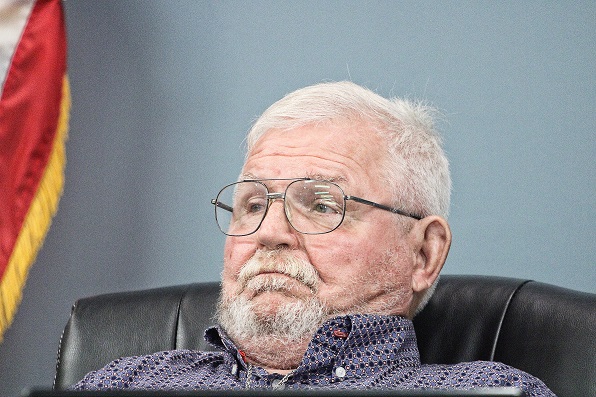

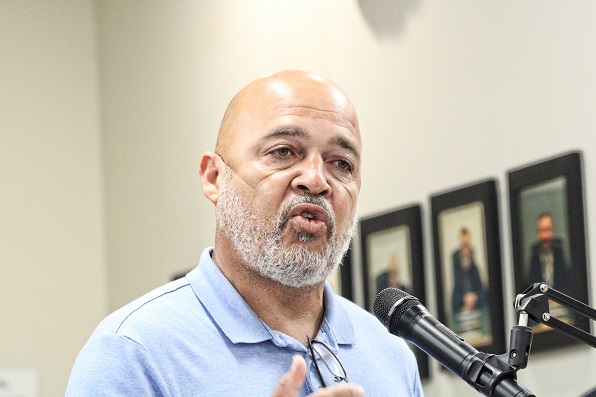

—————————-
City of Williston Regular Meeting July 19, 2021; Posted July 23, 2022





